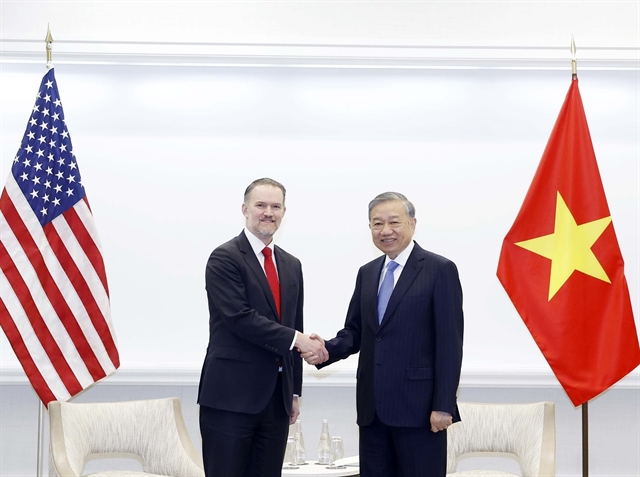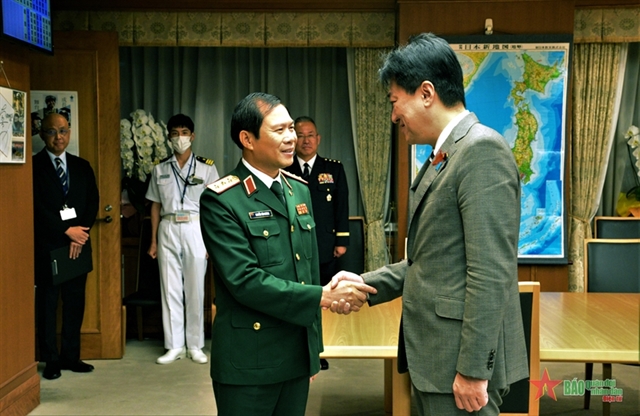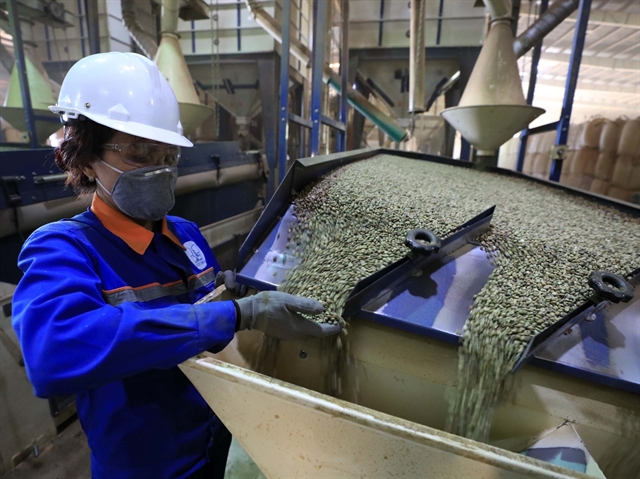 Politics & Law
Politics & Law

 |
| Senior Lieutenant General Nguyễn Tân Cương, Chief of the General Staff of the Việt Nam People’s Army (VPA) and Deputy Defence Minister, had talks with Japanese Minister of Defence Kihara Minoru. — Photo from Việt Nam People's Army newspaper |
TOKYO — Senior Lieutenant General Nguyễn Tân Cương, Chief of the General Staff of the Việt Nam People’s Army (VPA) and Deputy Defence Minister, had a meeting with Japanese Minister of Defence Kihara Minoru in Tokyo on October 11.
The Vietnamese officer informed the host of the outcomes of the talks between the delegations of the VPA’s General Staff and the Japan Self-Defence Forces Joint Staff, expressing his hope that Minister Kihara will provide guidance for relevant agencies of both sides to comprehensively and effectively implement the agreed defence cooperation contents, contributing to deepening friendship and cooperation between the two countries.
Humanitarian assistance and overcoming post-war consequences are areas of cooperation that both sides consistently value, Cương stressed, showing his desire that the Ministry of Defence, the Ministry of Foreign Affairs, the International Cooperation Agency of Japan and related agencies continue promoting cooperation with the Vietnamese Ministry of Defence in these works, particularly in projects related to landmine clearance and provision of equipment for dioxin decontamination.
He conveyed the congratulatory message and invitation to visit Việt Nam from Vietnamese Defence Minister General Phan Văn Giang to the Japanese officer.
For his part, Minister Kihara thanked for Defence Minister Phan Văn Giang's invitation and congratulatory message, and said that he will visit Việt Nam as soon as possible.
The Việt Nam–Japan defence cooperation is entering a new phase of development, opening up opportunities for collaboration in numerous areas between the two defence ministries, Kihara said.
He hoped for a higher, deeper, and more effective level of the cooperative relations.
Earlier the same day, Cương held talks with General Yoshida Yoshihide, Chief of Staff of the Japan Self-Defence Forces Joint Staff.
Both sides agreed that their defence cooperation has deepened and become more collaborative over the past time on the basis of the Memorandum of Understanding on Bilateral Defence Cooperation and Exchanges in October 2011, and the Joint Vision Statement on Defence Cooperation towards the next decade in April 2018.
The two countries have promoted delegation exchange, effectively maintained consultation and dialogue mechanisms, worked together in defence industry and settlement of post-war consequences, and supported each other at multilateral forums in the region, particularly the ASEAN Defence Ministers’ Meeting Plus (ADMM).
Particularly, both sides joined hands to organise the Competency Evaluation Programme for Prospective United Nations Peacekeepers (CEPPP) in Việt Nam last September, fulfilling the role of co-chairs of the 14th meeting of the Experts’ Working Group on Peacekeeping Operations Cycle 4 for the 2021-23 period within the framework of the ADMM.
Cương and Yoshida reached consensus on several measures to promote the bilateral defence ties, with a focus on delegation exchange, maintenance of existing consultation mechanisms, human resources training, implementation of a programme to improve capacity in the fields of diving medicine and clearance of naval mines, UN peacekeeping activities, recovery of post-war consequences, and bolstered coordination at multilateral mechanisms.
They compared notes on international and regional issues of shared concern, and emphasised the importance of maintaining peace, security, safety, and aviation and navigation freedom in the East Sea (known internationally as the South China Sea), and settling disputes by peaceful measures in line with international law, including the 1982 United Nations Convention on the Law of the Sea (1982 UNCLOS). — VNS


.jpg)

